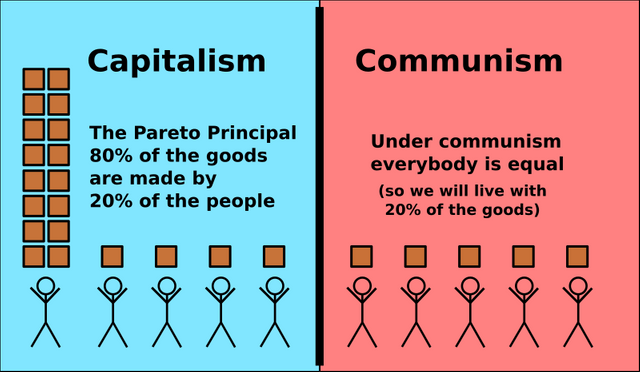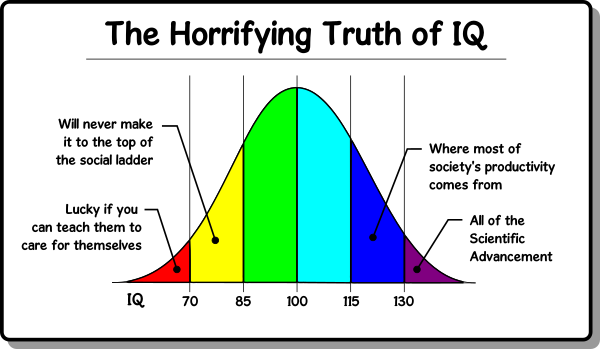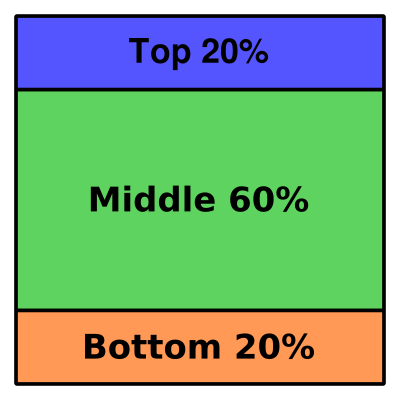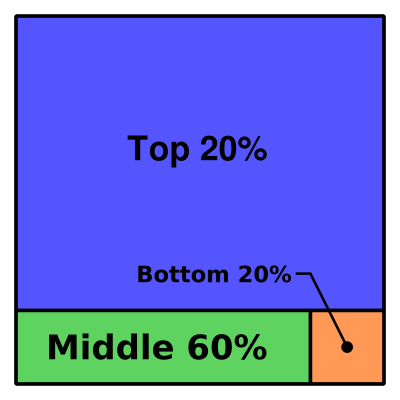
This is not going to be a discussion about communism or capitalism or socialism, this is going to be a lot more meta.
Each of these systems have HUGE flaws, and they all start from not working with real people. Just some imaginary group of people. "If humans were just this way", then communism/socialism would work. But, humans aren't that way, and how dare we try to force people into a mold that is not only not them, but bad for them. Destructive to them.
People are not all independent creatures making completely independent thoughts (choice selections) nor are they all collective thinking and acting worker bees. People are not cogs for the machine, nor are they all free thinkers. Even the free thinkers are not really that far off from the norm.
Any political/social/economic system has to start from what humans are.
We study what humans are when it comes to propaganda and advertising. But our political systems are built opposed to that.

Each Human has an ability level
Besides having a innate skills, or desires to do certain things, people also have a base level aptitude.
Like an (seriously) autistic man i know, knows everything about monster trucks. EVERYTHING. However, he is barely able to function as a bus-boy in a busy restaurant around lots of people.
Similarly, a lot of people have passions/hobbies that are not profitable. Not really something that makes money or puts food on the table. (and this is probably a good thing. The way to destroy a hobby is to turn it into a job. Then you will learn to hate what you used to love)
Along with their passions and abilities, there is the people's base level of being able to do things, to puzzle out things. The best measurement we have, of this is IQ.

IQ limits what a person can do, is able to do, in ways that you can't get around. You can think of it as similar to height in the NBA. It is not everything, but it is a great deal of how well you can dunk.
A person can go into chemistry with an IQ of 115, but they will never be a great scientist. But, they will probably be very good at putting the correct amount of solution in every petri dish.
A person down at the bottom end of the scale would like to do things, like tie their shoes, but just can't. They have a problem with controlling their muscles. They have a problem with keeping the order of tying shoe laces.
The point is, if we are setting up a social system, we have to work with what we have. And we have to consider, allow, and work with all the outliers. (we do a VERY!!! BAD job of dealing with high IQ children in govern-cement schools)

The Pareto Principal.
The Pareto principal said that in, any system, 80% of the results are created by 20% of the people.
(this works from the top as well as from the bottom)


Ignoring this is why communism has failed every time.
You cannot kill off your top farmers, and then expect to have the same food supply.
(Even in the seeds, 20% of the seeds that you sow, actually result in most of the food you get to eat.)
You also cannot kill off the motivation of the top farmers, and then expect to feed everyone. So, you need to have a system that provides motivation to all those people. Some are motivated by money, some by social approval, some by an internal desire. But, you better figure it out, and provide that motivation, if you want your system to function.
This is not all about the top producers, the bottom 20% are usually, not only producing less, they are more often messing things up for everyone else. They are the type of people who start harvesting someone else's crops before they are mature. And then, with the voice of all idiots say, "Well i didn't know".
The bottom 20% often push things in the wrong direction.
The military doesn't recruit anyone with lower than 86 IQ. In there words, below that, there is nothing that they can be assigned to do that is a net benefit to the military. They mess up at least as much as they get right.
However, these people still want to help out, and feel like they are part of the community. And if they don't get that, they are usually a hellava lot of trouble. They will rant and rave, and destroy things. Things, that in their whole lives they could never be able to replace.
A system that works for humanity will have to work for both ends of this distribution.

Pure market capitalism doesn't work because it ignores the bottom 20%.
Communism doesn't work because it destroys the top 20%
Capitalism only lasts longer because people are not immediately starving. But, it builds up a lot of resentment over time. Those who cannot compete, get very angry, and will take any opportunity to tear down the system.
Look for future changes. And make sure they work for everyone before jumping on board.
What will probably happen is we will collect into small communities "families", where a lot of the maintenance will be done by the middle people. Caring for the children, caring for the low IQ. It will be quite communistic at the lower levels, in a small community where everyone can see who is doing/providing what.
At the upper end, the community will be making a product to trade/sell with other communities. The best of the community will be competing/cooperating with other communities all over the world.
And thus, we will have an sorta independent system and a sorta dependent system. A hybrid inter-dependent system.
There are also other paths, where people start paying/tipping for everything that helps them. Like watching the kids, or getting helpful advice, like directions to get somewhere.

I believe what you are describing is called distributism. Instead of the centralization of state ownership or multinational conglomerates we have peer to peer networks of proprietors, partnerships, consumer and producer co-ops, ESOPs, community land trusts as the predominate goods and services institutions. I don't think we can quiet get ride of the multinational conglomerate model but their ideological commitment to ESG will make it much easier to convince others to abandon it especially when they start denying services for purely ideological reasons.
Downvoting a post can decrease pending rewards and make it less visible. Common reasons:
Submit